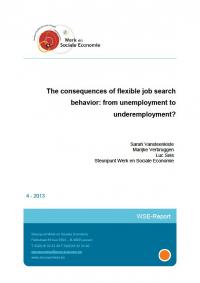Gedaan met laden. U bevindt zich op: The consequences of flexible job search behavior. From unemployment to underemployment?
The consequences of flexible job search behavior. From unemployment to underemployment?
Though unemployment frequently ends up in underemployment, few studies have combined insights from both job search and underemployment research. Drawing on both research fields, this study explores the relationship between job search behavior and reemployment quality. So far, most studies found little explanatory power for models that examine this link (Koen et al., 2010). By using underemployment as a mediator, we did find support for this relationship and gained more information on how search behavior influences reemployment quality. Next, our results also give more insight in how people end up in underemployed jobs, which so far has rarely been investigated (Feldman, 1996; Maynard, 2011). To this end, we focused on flexibility as a job search behavior. Flexibility is considered to be one of the key behaviors in the job search process by both policymakers and scholars (see e.g. Van den Broeck, 2010; Venn, 2012). Our results demonstrate however, that there are downsides of searching flexibly during the job search process in terms of job quality. To perform our analyses, we draw on longitudinal data of 304 Flemish unemployed individuals, collected in 2011-2012.
- Uitgever
- Publicatiedatum
- Juni 2012
- Publicatietype
- Onderzoeksrapport
- Auteur(s)
- Steunpunt Werk en Sociale Economie – HIVAMarijke Verbruggen, Luc Sels, Sarah Vansteenkiste, Marijke Verbruggen, Luc Sels
- Reeks
- WSE-onderzoeksrapporten
